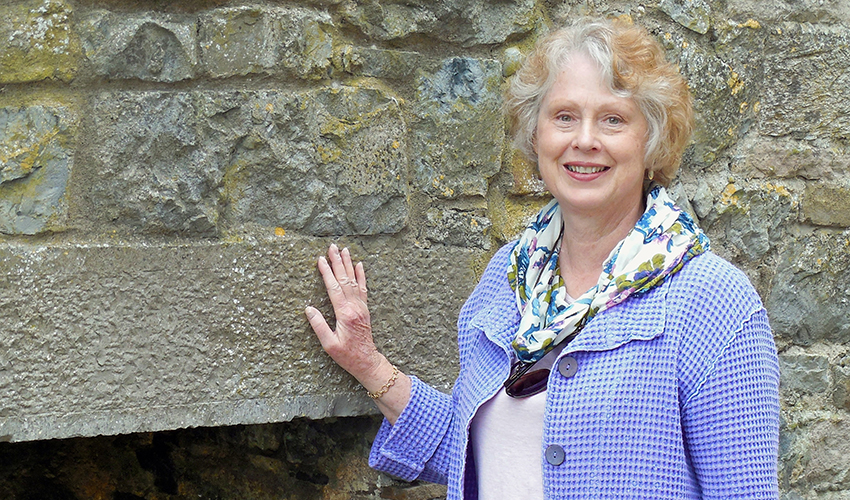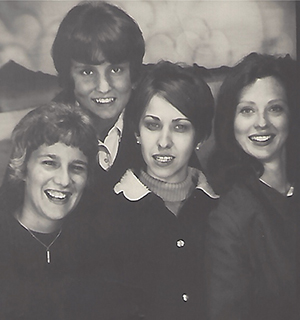OHIO’s Class of 1971 reflects on campus, life experiences 50 years after graduation

This photo, taken by Harry Snavely, BFA ’51, and featured in the July 1971 Ohio University Alumni Journal, shows June 1971 OHIO graduates posing for photos in front of Class Gateway following Commencement ceremonies held in the Convocation Center. According to the publication, 2,791 students earned their OHIO degrees during the 1970-71 academic year.
For the United States, 1971 was the year of Ping-Pong Diplomacy and the Pentagon Papers. Walt Disney World debuted as did the nation’s first Starbucks. The 26th Amendment, lowering the voting age from 21 to 18, was certified, and the Vietnam War – and the protests against it – continued.
At Ohio University, the 1970-71 school year was defined by the year that had preceded it. Students returned to the Athens Campus after the May 15, 1970, closing of the University, following days of increasingly violent protests at college campuses across the country in the wake of members of the National Guard opening fire on a crowd at Kent State University, killing four students there.
1971 saw the completion of a two-year project to re-route the Hocking River, which ran through the center of campus, to its current location and the birth of the All-Campus Radio Network (ACRN), which continues to thrive today. Construction on the east and west wings of Alden Library, which opened in 1969, was underway. And, 1972 OHIO graduate and Baseball Hall of Famer Mike Schmidt was drafted by the Philadelphia Phillies, launching a legendary career in the sport.
It was against this backdrop that OHIO’s Class of 1971 graduated 50 years ago. As the members of the Class of 2021 prepare to don their commencement caps and gowns, OHIO News caught up with four of this year’s Golden Bobcats to discuss their OHIO experience, life on campus when they were students, and the 50 years that have passed since they graduated.

Mimi Bogard, AB ’71, English major
What is your favorite memory of your time as an Ohio University student?
Spring. I’m sure spring still brings everyone out onto the green. My favorite were those sunny spring days. We’d sit on the low wall in front of Cutler Hall – I’m sure people still do – and people-watch College Green. There was always somebody strumming a guitar, a group playing frisbee, probably an English class that had escaped Ellis Hall. That’s a favorite scene in my memory, and when I picture it, I still hear the noon chimes. I hope the chimes are still ringing there. (They are!)
What clubs or activities were you involved in at Ohio University?
My favorite high school activity had been choir, so at OU I sang in the University Chorus and the Wesley Choir at the First United Methodist Church. That was a deliberate step down from what had been a very heavy high school activity life. I came to college to find my own path, and I intentionally chose not to overburden myself with extra demands. I think that was a good decision that every student should do with intention. The real success of my college education was that I discovered who I was.
What was life like on campus while you were a student?
It was pretty much the cliché image of the late ’60s, but probably more diverse than the cliché. The student body was – and probably still is – very representative of all Ohio and beyond. In fact, it was that very diversity that attracted me to OU. There was no pressure there to be anything but oneself.
Of course, campus unrest was part of that time. Social issues triggered protests big, small, some violent, mostly addressing the Vietnam War but also racism, gender equity, environmental health. The May 4, 1970, Kent shootings and the subsequent OU closing were probably the most disturbing of those for me. I drove out of Athens on May 15th with National Guardsmen lining the sidewalks, and that’s still a chilling memory. …

But, on the other hand, there was a lot of joy in campus life. You can’t congregate 20,000 young people in a somewhat defined area and not expect a lot of fun. … Even the flood of ’68 was a social event. I lived on West Green, and we all got over to East Green to look at their flood, and they did the reverse. It was a horrible situation, but everybody had a good time in spite of it.
And there were always things to do on campus. The program calendar was full of athletic and fine arts events. We were regulars at the MIA, “Movie in the Auditorium.” That place was packed full. Pre-social media, that’s what you did. You got together and enjoyed those sorts of things. It was a great way to meet new people. And my friends and I on a sunny day always explored both the campus and the town. There were far corners that were adventurous for us.
Tell us about your life after graduation.
I took my degree in English and prepared to teach, but positions for English language arts teachers were pretty scarce that year. I did, however, find a place at Sandy Valley Junior/Senior High School in Magnolia, Ohio. My entire education – K through bachelor’s degree – had been at large public schools, so I was unsure that this small, rural school setting was right for me, but it turned out to be the best place I could have landed. I taught English there to begin with, high school English, followed by many years as the school’s library media specialist, having earned my master of education degree at Kent State. I am forever grateful for a 35-year career there alongside wonderful people, and if that school name or town sounds familiar at all, it’s likely because one of Sandy Valley’s beloved alumni is OU Head Basketball Coach (and another OHIO graduate) Jeff Boals. What surprises people about small, rural schools is what we told our students there regularly: You can go anywhere from Sandy Valley, because we had so many fine alumni who did. …
I am quite active in the League of Women Voters of the Canton Area, and although I was certainly not a political science major at OU, that citizen’s awareness was really engendered by my time in Athens during those times of protests. I learned to speak up for myself and for others, and now I do that through the League of Women Voters.
There is one other anecdote I’d like to share, and we all have this experience. When you’ve been traveling for an extended period of time and you return home and that emerging feeling of homecoming – I think it’s a mix of relief, security, belonging. Well, over the last 50 years every time I’ve approached Athens, I’d drive in on State Street and down Congress, I have that same phenomenon, that experience. It’s a powerful sense of being home, and to me that is the OU effect. I don’t have friends who feel that about their own alma mater. There’s a special sense of attachment. I’ve had numerous relatives also attend OU, and we all remark on just how strange that feeling is. Now I’ve always lived in Canton, but my relatives have lived in a number of places, and they say they don’t feel that about any other place they’ve lived. It’s just, something happens in those years at OU that always makes you feel at home.
What advice would you give to Ohio University students today?
I would offer two suggestions. First, explore the possibilities, don’t be afraid to take an academic risk. I would advise a student that whenever possible choose a course that piques curiosity, something that falls outside of your major, far outside. My junior year, for instance, I finally caved to my general advisor and took a geography course, which was his area of expertise, and had I dabbled in that earlier, I might have become a very happy cartographer. It was very interesting, but it was too late in my college career to switch paths that radically. Dr. (Ted) Bernard was his name. I hope he’s still around; he would probably laugh to hear that story.
The second advice I would give to students is to make use of the University’s student services – the advisors for academics, career prep, health, finance – because the University is staffed with professionals who above all else want students to succeed, and I’m not sure that all students take as much advantage of that as they could. I think often students – it’s the first time they’re feeling independent, and they don’t want to ask for help because they’re guarding that independence. But those are wonderful services that their tuition is supporting, and really there are good people…
Read More: OHIO’s Class of 1971 reflects on campus, life experiences 50 years after graduation

